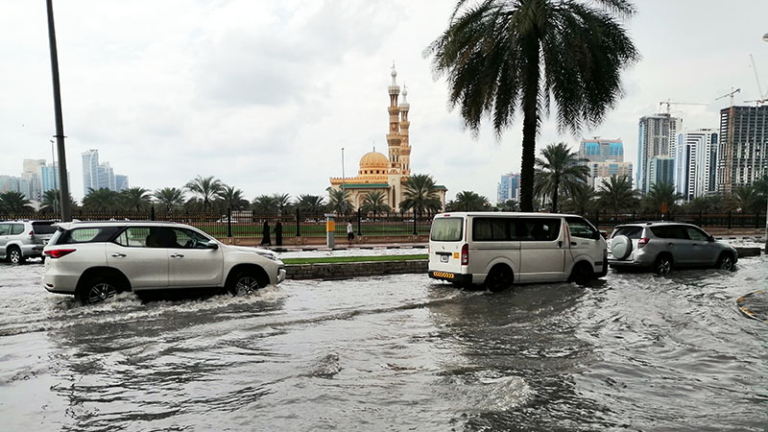
It has become undeniably clear that climate change is already wreaking havoc across the globe, destroying lives and livelihoods and drastically altering entire ways of life. With the international community so far having failed to take meaningful action on the issue, and with a recent United Nations report stating that the world will almost certainly be unable to attain its goal of keeping global warming to 1.5 degrees Celsius, humanity will undoubtedly continue to suffer these ills for many decades to come. Nowhere will the impact of climate change be felt as strongly as in the Middle East, which according to one study is warming twice as fast as the rest of the world. If the international community’s inaction continues, there will be dire consequences, not just for the region itself, which will soon face a myriad of humanitarian crises, but also for the wealthy countries that are responsible for climate change in the first place, and that refuse to do enough to limit its effects.
Regional Environmental Troubles
Across the Middle East and North Africa, countries are already being forced to deal with the reality of climate change on a number of fronts. In Jordan—already a water-poor country due to decades of upstream water diversion by Israel and Syria—climate change-induced drought is causing unprecedented levels of water scarcity. Across the region, desertification is threatening population centers big and small, from the illustrious city of Dubai to lifegiving oases in southeastern Morocco. In Iraq and elsewhere, farmland is rapidly becoming poisoned by salts, threatening the local, and eventually the global food supply. And in Lebanon, massive wildfires have become an annual event, burning huge swaths of the few forests that the country still has left. Meanwhile, a greater frequency of extreme weather events, unbearably high temperatures, and climate-compounded population pressures all threaten to cause irreparable damage to land, property, and people.
All of these challenges come with significant knock-on effects. Soaring temperatures in the Gulf, for example, are already taking dire tolls on the health of migrant workers, and negative health outcomes are certain to multiply as the years pass. In addition, climate change has been shown to exacerbate existing armed conflicts, and even has the potential to cause new ones, especially as the region’s groundwater aquifers, many of which are shared, begin to run dry. As these pressures continue to build, climate-related migration, which has already begun in the Middle East on a domestic level, will become one of the strongest driving forces in politics and the global economy. But despite the urgency of these and other crises across the world, little has been done at the global level beyond making the usual array of empty promises.
A Nonchalant International Response
The degree of the international community’s foot-dragging on climate change has indeed been appalling. To cite just one example of inaction, the first global water conference in 46 years took place only last March. This lengthy interval in addressing such a crucial issue—and one that is inextricably tied to climate change—as well as the fact that the conference resulted in little more than voluntary commitments, is, sadly, not surprising. Given that the four entities that emit the most greenhouse gasses—the US, the EU, China, and India—are all failing to reduce their emissions to levels agreed upon in the 2015 Paris Agreement, one should hardly expect attention to be paid to a matter as consequential as water.
Even the UN’s yearly climate conference, the Conference of the Parties (COP) has become little more than a PR moment for bad actors, and has produced very few truly beneficial developments. Last year’s COP27, which took place in the coastal resort town of Sharm el-Sheikh, Egypt, saw its host country sign billions of dollars in energy and transport deals while simultaneously living up to its reputation as one of the world’s leading human rights violators by cracking down on protests during the conference to ensure that world leaders could enjoy their meetings in peace.
The fact that the UAE has appointed the head of its state-run oil company as the president of this year’s climate conference in Dubai (COP28) surely signals that more of the same is in store. And this is a large part of the problem: responding to climate change continues to be seen as a business opportunity and investment strategy, and as yet another chance to get ahead in the never-ending quest for profits. What is desperately needed now is a paradigm shift. As long as renewable energy and other projects to mitigate climate change are seen through the lens of business and capital rather than as humanitarian and human necessities, “profits over people” will continue to be the order of the day.
What Can Be Done?
Climate change must be dealt with as a truly global, cross-border humanitarian crisis, and our proposals must be just as big as the problem, if not bigger. What might this look like? Grants for community-driven efforts rather than profit-driven partnerships? A worldwide mandatory progressive tax system and wide-scale redistribution measures? A monumental global investment of energy and funding into the rapid research and development of tools and technology to combat climate change? The creation of an international entity with a global mandate and the authority to actually do something? Even a reconsideration of the nation-state paradigm that has so fiercely reigned for the last four centuries or so should not be out of the question if humanity is to survive this crisis. Although these suggestions may sound a bit far-fetched, considering that the world is facing a genuine catastrophe of existential proportions, we must be bold in reimagining our approach.
That said, some hesitant steps in the right direction have already been taken. For example, COP27 saw a historic agreement to establish a “loss and damage” fund to help developing countries combat the impacts of climate change. Although this is certainly a momentous development, and one that acknowledges for the first time—albeit indirectly—the fact that the developed world is largely responsible for climate change and that it owes reparations to the countries that are suffering from its deleterious effects, few details regarding the fund have been sorted out, and it is likely to remain more a gesture than a comprehensive plan.
The Biden administration, meanwhile, has acknowledged the significance of climate change and even introduced measures to help combat it at home and abroad. But it has done so while also approving a massive, 30-year-long oil drilling project in Alaska, which will likely undermine any good done by the United States’ other initiatives. Perhaps most worrying for the future is the issue of climate-caused migration. Although the Biden administration has issued a formidable report on the matter, its positive actionable impacts remain to be seen. And more importantly, with the United States and many EU member states currently obsessed with preventing immigration to the greatest degree possible, it is easy to imagine what future action on climate-related migration will entail: diverse initiatives all with a self-interested focus on keeping people in developing countries where they are, even if it means greater suffering.
Instead of simply developing additional profit-driven initiatives and national security-focused measures or instituting piecemeal and stopgap solutions, the international community must begin to see this as a global humanitarian crisis that knows no borders. What is needed now are comprehensive short- and long-term solutions that aim to help the greatest number of people, regardless of nationality. Unless significant action is taken soon, the entire world will suffer greatly from wave upon wave of dire humanitarian crises. And as has all too often been the case, the countries of the Global South, and especially of the Middle East, will again bear the brunt of someone else’s consequences.
The views expressed in this publication are the author’s own and do not necessarily reflect the position of Arab Center Washington DC, its staff, or its Board of Directors.
Featured image credit: Shutterstock/Arnold O. A. Pinto

